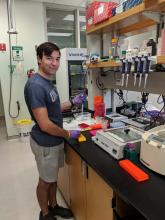The Le Pabic Laboratory studies the development of the skeleton using fishes as model organisms. My research goal was to determine when and where genes shaping the skull are expressed. For this I performed in situ hybridizations on whole- or sectioned embryos that I cared for and collected from our cichlid fish hatchery. The applications of my research could help treat human conditions such as cleft palate.
I initially read some of the research that Dr. Le Pabic had written and met with him to discuss it further. After expressing my interests, Dr. Le Pabic gave me an opportunity to do a DIS with him, working on fish care and maintenance. Then, we applied for the SURCA grant for the summer of 2018 to do my research on growth zones of African Cichlids and got it. I hoped this opportunity would help me gain practical knowledge and experience in using the technology and equipment required for developmental biologists.
I learned the proper protocols for in situ hybridization and cryostat sectioning. I became proficient at the skills required to maintain and breed dozens of fishes at a time. It was challenging to learn the genetics involved in the research that led up to my research project. I gained connections and experience in lab that cannot be learned inside a lecture hall.
My time working in the lab has shown me the how to properly perform simple, but necessary tasks that can be used broadly throughout many research labs: PCR, autoclaving, pipetting skills and documenting are just a few examples of the basic essentials. My research will greatly improve my ability to get into a graduate program. Most programs only look at your application if you have research experience of some kind. I was able to work closely with Dr. Le Pabic and gain knowledge from him that will be pivotal to building my career in science.





